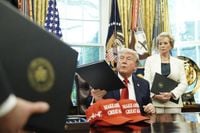As Donald Trump marks nearly 100 days into his second term, a wave of disillusionment is sweeping across America, largely stemming from his erratic policy reversals. These shifts, particularly concerning global trade and economic strategy, have left many citizens questioning the president's leadership.
Joseph Grieco, a political science professor at Duke University, remarked on the chaotic nature of recent U.S. trade policies, stating, "It is impossible that the United States' reversals on global trade in recent months were even vaguely prepared. It has been one improvisation after another." This sentiment resonates with the American public, as evidenced by a series of recent polls indicating a significant drop in Trump's approval ratings.
According to a survey released by Fox News on April 24, 2025, only 44% of Americans express satisfaction with Trump, a decline from 49% just a month prior. The dissatisfaction is even more pronounced regarding specific issues: 59% disapprove of his handling of the cost of living, while 58% are unhappy with his trade policies.
In a broader context, a Pew Research poll conducted earlier in April indicated that Trump holds a mere 40% favorability rating, a stark contrast to the historical averages of his predecessors. For instance, most presidents since Ronald Reagan, with the exception of Bill Clinton, enjoyed favorability ratings exceeding 50% after their first 100 days in office.
Further compounding these issues, a Reuters/Ipsos poll highlighted that only 37% of Americans are satisfied with Trump's economic policies. This marks a significant downturn from earlier in his first term, where economic performance was one of his strong suits.
In terms of economic sentiment, a YouGov poll from early April revealed that 51% of Americans are now dissatisfied with Trump's economic management, a sharp increase from 47% just weeks earlier. The fluctuations in public opinion seem to correlate directly with Trump's unpredictable policy announcements and his confrontational stance towards key figures like Jerome Powell, the head of the Federal Reserve.
After Trump publicly criticized Powell, labeling him a "loser" for not lowering interest rates, the stock market initially plummeted. However, it rebounded sharply when Trump clarified that he had no intention of firing Powell, a move that would represent a significant breach of the Fed's independence.
The uncertainty surrounding Trump's trade policies has also left many Americans anxious about their financial futures. A recent Gallup poll found that 53% of respondents believe their personal financial situation will worsen, a notable shift from the optimism typically observed in these surveys since 2001.
Despite these grim statistics, Trump's core support remains resilient. A Pew Research survey indicates that 70% of Republican voters still back his tariff increases, while 90% of Democratic voters oppose them. This stark divide highlights the intense polarization within the American electorate.
Trump's approval ratings have seen a steady decline since he took office, with the New York Times reporting that his popularity has dropped to 45%, down from 52% shortly after his inauguration. This decline is particularly notable among independent voters, who have shifted from 41% approval in January to just 36% by mid-April, with disapproval rising to 58%.
As the president approaches the 100-day mark of his tumultuous second term, he continues to assert that his administration is achieving significant successes, including a decrease in illegal border crossings, billions in new investments, and the release of Americans imprisoned abroad. He has also taken steps to dismantle diversity initiatives established under the previous administration.
Despite the mounting dissatisfaction, Trump insists that his administration is on the right path. He stated, "We’re going to make money with everyone, and everyone is going to be happy," during a recent press conference at the White House. This confidence, however, contrasts sharply with the skepticism reflected in public opinion polls.
The upcoming meeting in Michigan, where Trump is expected to address his supporters, will likely serve as a litmus test for his popularity and effectiveness as he navigates these turbulent waters. With the economy teetering and public trust waning, the stakes are high as he seeks to regain the confidence of the American people.
In summary, Trump's second term is marked by a series of controversial policy decisions that have left many Americans feeling disillusioned. With his approval ratings plummeting and concerns about economic stability growing, the president faces an uphill battle to restore faith in his leadership. The next steps he takes will be crucial in determining not only his political future but also the economic well-being of the nation.




